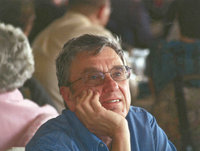Harold Lecar
University of California, Berkeley, California
Curator and author
Featured Author: Harold Lecar
Harold Lecar (b. in Brooklyn,USA, 18 Oct, 1935) was educated at Columbia University, where he received his PhD in Physics in 1963 on the use of Masers in microwave spectroscopy. From 1963 to 1985, he worked in the Biophysics Laboratory, NINDS, NIH, where he was once Richard FitzHugh's only postdoc. Since 1985, he have been a Professor of Biophysics and Neurobiology at the University of California, Berkeley.
In 1985, he received the Public Health Service Special Recognition Award for “contributions to the understanding of the role of membrane ionic channels in producing electrical excitability and for pioneering work in advancing single-channel methods."
Along with Gerald Ehrenstein and Ralph Nossal, he observed the first single gated ion channels in a synthetic membrane and established the statistical picture of ion-channel gating. With Ralph Nossal, he established the theory of how membrane noise produces action-potential threshold fluctuations. With Fred Sachs and Meyer Jackson, he initiated the patch-clamping of excitable cells grown in tissue culture which led to the study of numerous gated channels. Cathy Morris and Dr. Lecar developed the reduced equations, which bear their name as a way to map the variety oscillatory behaviors seen in excitable cells.
Scholarpedia articles:
(Author profile by Biswa Sengupta)
Previous featured author:



